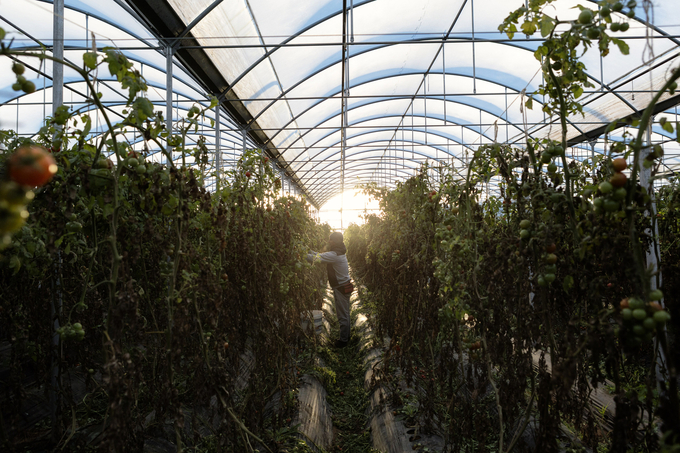June 20, 2025 | 18:03 GMT +7
June 20, 2025 | 18:03 GMT +7
Hotline: 0913.378.918
June 20, 2025 | 18:03 GMT +7
Hotline: 0913.378.918

The process, launched as a concrete package of solutions, will undergo extensive fine-tuning and elaboration over the next three years.
Today, the Food and Agriculture Organization (FAO) initiated the process for the development of a groundbreaking global roadmap aimed at eliminating hunger and all forms of malnutrition without exceeding the 1.5°C threshold set by the Paris Agreement.
Unveiled at the United Nations Climate Conference COP28, the Global Roadmap for Achieving Sustainable Development Goal 2 (SDG2) without Breaching the 1.5°C Threshold outlines a comprehensive strategy spanning the next three years that encompasses a diverse portfolio of solutions across ten distinct domains of action.
Against the backdrop of a projected 600 million people facing chronic hunger by 2030 and an escalating global climate crisis, the roadmap calls for a transformative shift in agrifood systems. It challenges the prevailing narrative that increasing production is synonymous with higher emissions and environmental degradation. Instead, it emphasizes the opportunity within agrifood systems to enhance production efficiency while aligning with climate mitigation, adaptation, and resilience objectives.
The roadmap identifies 120 actions and key milestones within ten domains, supported by evidence gathered by FAO over several years. These domains include clean energy, crops, fisheries and aquaculture, food loss and waste, forests and wetlands, healthy diets, livestock, soil and water, and data and inclusive policies — the latter two identified as overall systemic enablers.
On the emissions front, it aims to reduce agrifood systems' methane emissions by 25 percent by 2030 relative to 2020, achieve carbon neutrality by 2035, and transform them into a carbon sink by 2050, capturing 1.5 gigatons of greenhouse gas emissions annually.
Concerning food and nutrition, it sets a path to eliminate chronic undernourishment by 2030 and ensure access to healthy diets for all by 2050. Additional milestones include halving per capita global food waste by 2030 and updating Food-based dietary guidelines (FBSG) by countries to provide context-appropriate quantitative recommendations on dietary patterns.
The roadmap also emphasizes the symbiotic relationship between agrifood systems transformation and climate actions, urging the mobilization of climate finance for implementation.
"FAO's Global Roadmap for SDG2 and 1.5°C underscores the importance of climate financing for agrifood systems transformation to achieve good food for all, today and tomorrow”, said FAO Director-General QU Dongyu.
Highlighting a just transition at its core, the roadmap envisions transforming agrifood systems from a net emitter to a carbon sink. It calls for alternative production methods, adjusted consumption patterns, refined forestry management, and innovative technologies such as carbon capture.
Advocating for global resource optimization beyond crop production, the plan suggests rebalancing consumption patterns and promoting healthy diets for all. It stresses that adaptability to specific contexts is crucial, cautioning against one-size-fits-all solutions.
The process, launched as a concrete package of solutions, will undergo extensive fine-tuning and elaboration over the next three years. COP29 will delve into regional adaptation and financial options, while COP30 will outline concrete investment and policy packages at the country level.
FAO's call for this comprehensive global roadmap aligns seamlessly with its mandate and organizational capabilities, leveraging expertise across diverse topics.
A roadmap to guide the implementation of the Emirates Declaration
Representing the FAO Director-General, Chief Economist Máximo Torero presented the roadmap at a COP28 Ministerial Event dedicated to supporting the recently launched Emirates Declaration on agriculture, food, and climate action, which has now been endorsed by over 150 countries.
"FAO is committed to supporting countries in translating the Emirates Declaration on Sustainable Agriculture, Resilient Food System, and Climate Action into full implementation by scaling up agrifood system solutions guided by the new FAO Roadmap launched today," Torero told ministers. He explained that FAO is currently working with the COP28 Presidency and partners on a technical cooperation initiative to accelerate action.
The Chief Economist announced that, together with the International Fund for Agricultural Development (IFAD), the World Bank, and CGIAR, FAO will also launch the Agrifood Sharm-El Sheikh Support Programme, a three-year support package consistent with the roadmap to help advance and operationalize the Sharm el Sheikh joint work and its outcomes.
"The program will support knowledge, evidence, and tools that help raise ambition through the UNFCCC processes, unlock finance, and accelerate action on the ground," he explained.
Torero underscored the need to build on existing efforts and collaborate to resolve the "enormous challenge" the world is facing.
"We need to bring common definitions, consistency, and complementarity to the actions and policy frameworks we are implementing. The roadmap shows that achieving these goals, with the right set of actions, is compatible with agrifood systems that are net carbon sinks," the Chief Economist emphasized.
(FAO.org)

(VAN) Poultry production in Poland, which has only started recovering from devastating bird flu outbreaks earlier this year, has been hit by a series of outbreaks of Newcastle disease, with the veterinary situation deteriorating rapidly.

(VAN) Extensive licensing requirements raise concerns about intellectual property theft.

(VAN) As of Friday, a salmonella outbreak linked to a California egg producer had sickened at least 79 people. Of the infected people, 21 hospitalizations were reported, U.S. health officials said.

(VAN) With the war ongoing, many Ukrainian farmers and rural farming families face limited access to their land due to mines and lack the financial resources to purchase needed agricultural inputs.

(VAN) Vikas Rambal has quietly built a $5 billion business empire in manufacturing, property and solar, and catapulted onto the Rich List.

(VAN) Available cropland now at less than five percent, according to latest geospatial assessment from FAO and UNOSAT.

(VAN) Alt Carbon has raised $12 million in a seed round as it plans to scale its carbon dioxide removal work in the South Asian nation.